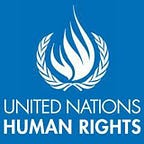Protesters in Venezuela subjected to increased human rights abuses
A UN Human Rights Office report looking into the human rights violations and abuses during demonstrations in Venezuela over a four-month period shows the alarming increase in the use of excessive force by security personnel on protesters.
When José and Elvira Pernalete went to search for medicines, they didn’t expect to never again see their son.
It was April 2017, and the couple had dropped off Juan Pablo, a university student and athlete, to meet friends in town and take part in the demonstrations. This was in Caracas, Venezuela, a city that was gripped by the daily protests and long lines to buy food that have marked this political and economic crisis.
But when the couple arrived at their home hours later, they found that their son was missing. They went to the city centre to get more information and that was when they heard the news: Juan Pablo was dead, killed by a tear gas canister.
“They ripped our soul out; he was our only son,” José Pernalete said. “We do not want them to continue killing so many boys.”
Juan Pablo’s death was one of numerous deaths and injuries documented in a recent report by the UN Human Rights Office, looking into the human rights violations and abuses towards protestors in Venezuela. The crackdowns were being conducted by for the most part by the Bolivarian National Police (PNB) and the Bolivarian National Guard (GNB), with armed militias or colectivos aligned with the government also being reported as responsible. Among the disturbing trends documented, the report showed an increase use by government forces of normally less-lethal crowd dispersal weapons in deadly ways.
“Less lethal weapons were used systematically in a manner intended to cause unnecessary harm, for example security forces shot tear gas grenades directly at demonstrators at short range,” the report stated.
The country’s Attorney General, who looked into Juan Pablo’s case, determined that the tear gas canister that killed him was most likely to have been launched when he was 25 meters away. Standard protocol with the launch of tear gas state the devices must be launched between 120 to 150 meters away from demonstrators.
Shortages and protests
Since 2014, the Bolivarian Republic of Venezuela has experienced an increase in the economic crisis derived from the drop in the international price of oil and other factors such as currency and price controls. This has led to hyperinflation and severe shortages for food, medicines and electricity.
During the same period, the country experienced a deepening political crisis. In December 2015, the opposition won two thirds of the seat in the National Assembly and a month later, January 2016, the new Supreme Court of Justice, declared the National Assembly to be in contempt, citing electoral irregularities in the State of Amazonas. The court denied legal validity to any of the Assembly’s decisions. The opposition then initiated a recall referendum against President Nicolás Maduro, which has been indefinitely postponed.
The UN Human Rights report looks at the human rights situation of protesters during this period and found numerous violations. These include excessive use of force, violations of the right to life and physical integrity, arbitrary detention, and the violation of the right to peaceful assembly.
Deadly Violence
The report found that security forces systematically used excessive force to disperse demonstrations, breaching international and domestic standards. One practice was the use of motorcycles to chase protesters. Demonstrators told human rights experts that groups of about 20 motorcycles with two security officers — one driving and the other carrying anti-riot weapons — would track down demonstrators when they would begin to disperse. Many demonstrators were injured trying to escape or because of blows by security officers.
But it has been the use of non-lethal weapons with lethal force that has drawn increased concern.
In interviews and eye witness testimony from doctors and others, human rights experts documented numerous cases where things such as plastic bullets, buckshot and tear gas canisters were used as lethal weapons.
One doctor working in the State of Lara said that he has treated numerous people with injuries sustained from bolts, rubber bullets and plastic pellets. One of the worst was the case of Antonio Gruseny Canelon. Gruseny was protesting in his neighbourhood when the GNB came with tanks. They shot tear gas and plastic bullets into the crowd.
The doctor saw Gruseny, who had been brought in suffering from gunshot wounds. Gruseny was operated on the same day and was found to have been shot twice with plastic bullets — one in the chest and the other in the abdomen. The doctor estimated that for the pellets to have that effect, Gruseny would have to had been shot from no less than two meters away.
There were also complaints of lack of medicines available to treat the injured, as well as harassment of medical personnel both during the demonstrations and in hospitals.
“Working under these conditions has been very difficult,” the doctor said. “That is why we have organized to denounce this situation. Along with the young people that have died in this country, there are patients who die every day who should not die for lack of medicines.”
A way forward
The UN Human Rights Office report is clear: the risk of further deterioration of the human rights situation in Venezuela remains high “as the social crisis remains dire and the polarizing political tension continue to escalate.”
There are a number of recommendations to move forward, including ending violent repression of peaceful demonstrations, ordering police forces to use de-escalation tactics when policing assemblies, public condemning all cases of torture and ill treatment, and ensuring prompt, independent and effective investigations of human rights violations involving security forces and abuses involving armed groups (colectivos), security forces or violent protestors.
Learn more about what the UN Human Rights team found in Venezuela by reading the full report.
